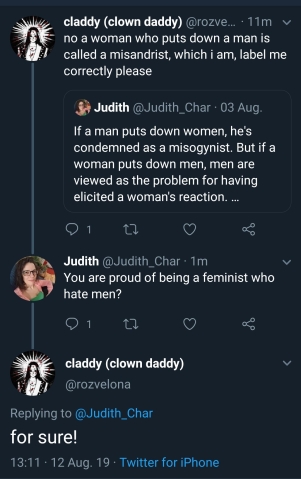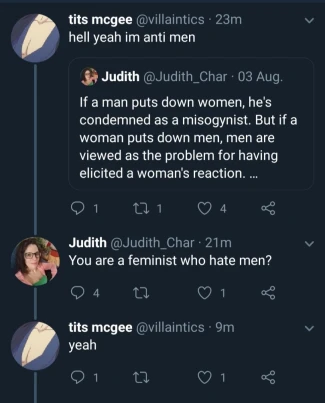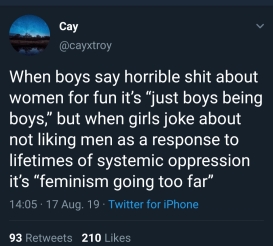I am not interested at being looked at as a sexualized person. As a woman, I don’t want to arouse people in any way because I want you to pay attention to what I have to say, not what I look like. Being attractive can distract and modesty is the tool, the power women have to control how they are perceived by others.
Being attractive and appealing is a game women play. The goal is to reach the top of the female dominance hierarchy. Those who reach the top are the one who compete with their peers at looking better and more attractive. Women engage in such competition with each other because that is how their status as alpha female is on full display. It makes them stand out amongst their contemporary as being the better prospect, which has the added benefit of attracting the best possible mates. Men are especially enticed by women’s physicality, women know this pretty well and it does motivate their behaviors. Just like competing with each other motivate their desire to elevate their own status by using their appearance.
In the 40’s and 50’s, it used to be that women who use their own body and attractiveness to get attention were shamed and devalued. “Sluts” were women of low morals and social standings who acted against the social norms of what a good woman ought to be. Shaming these women helped cast away what was deemed to be poor and unwanted behaviors. While this was also used to keep women in narrow socially defined gendered roles (mothers and virgins), it also helped to view them as being smart and capable people. The good girl was an educated lady, while the bad girl smoked and hung around with boys. Those constrictive views of women did help highlight their better qualities by shaming in them any display of poorer qualities. With the efforts of modern feminists’ mentality, such as pretending that anything a woman does is brave and empowering, they have tried to redefine the meaning of what it is to be a “slut”. They now walk proudly and half naked in so called Slut Walks in an attempt to displace the shame from being put onto women by putting it unto those who are doing the shamming. They are trying to claim as positive a term that has been used to highlight the negative. All of that so women can be free from being criticised when they chose to act poorly. Modern feminism as made it a big no-no to criticize women in any way, even if it is to help quell toxic and problematic behaviors. Violent and abusive women now being regularly supported in feminists circles.
The 60’s and the 70’s were times of sexual revolutions, where the younger generation seek to rebel against the rigid social construct of their parents by engaging in free love. It helped shape a new perspective of sexuality. It moved from a taboo topic rarely discussed in polite discussions to a more mainstream and popular subjet. The commercialization of the contraceptive pill played a huge role in liberating women from old social standards. Sexuality became to be understood as a natural act of human behavior rather than something to be ashamed of. Shaming women for acting out sexually became a judgmental habit to be curbed.
It’s in the 80’s and 90’s that corporations popularized the idea that “sex sells”. Putting images of pretty sexualized women in ads and commercials became normalized. To the point where people questioned such methods and wondered what the impact on society would be. Those who opposed the use of women’s bodies to sell products worried that objectifying women like that would be detrimental in trying to value women as more than just object of desire.
The social media age we now live in didn’t see women walk away from ideas of objectification. Instead, they have embraced it when they realized the power there is to be gained by sexualizing and objectifying themselves. Fame and fortune is what there is to be found when women raise their status enough to reach the top of the female dominance hierarchy. Contrary to second wave feminists, third and fourth wave feminists see nothing wrong in self objectification. All they see is the power to be gained. They’ve twisted the idea that objectification is wrong unto viewing that anything a woman does to gain power is good and should be encouraged. Because after all, a desire for more power is at the core of modern feminism. The entertainment industry and Instagram culture are the best examples. Pretty much any women on the internet knows that the easiest way to attract people to you, men or women, is to sexualize yourself in some way. The more you follow modern beauty standards, and the less clothes you wear, the bigger your audience can be. Exposing themselves in such a manner, is the simplest and easiest way for women to gain status.
This is peek toxic femininity and there is no business where it is more exploited than the beauty industry. Corporations sell a seemingly limitless array of products design to make women look better. From clothes, to shoes, handbags, jewelry, cosmetics and hair products, there isn’t an inch of your body that they don’t have a product for you to use to beautify yourself with. This is the exploitation of female vanity and narcissism. This reminds women that their value isn’t just in their appearance but in putting effort in modifying their appearance by consuming goods. Feminists’ attitudes are encouraging such behaviours because deep down, women not only like to look pretty and feel beautiful but they know that winning this game raises their status and power.
The feminism I was raised with told women that they are worth more than just their looks. Modern feminism tell women they don’t have any power so anything she does, including sexualizing and objectifying herself, is in fact an act of defiance, empowerment and bravery. This encourage toxic and irresponsible behaviors; it promotes women as objects of attraction. This is such a huge setback in the promotion of women as being on equal standing with men. Modern feminists have sold out their ideals and principles for the sake of beauty and power. This is corruption in its truest form.
Modesty thus became the enemy of feminism. It became to be viewed as an oppressive restriction on their ability to fully express who they are as women. They started to shame, not the women who acted poorly, but those who dared criticize a woman for using their power of attraction for selfish gains. They disguised this idea that any display a woman makes of her body as a valid and even necessary tool to boost their self-esteem and build their confidence. In our ongoing era of feminist self-exposure, the woman who expose her body become a rebel, a hero, a brave soldier in the front line against female oppression. In actuality, they are teaching an entire generation of women that their looks, their desire to be viewed as beautiful is what their goal should be as women, that being celebrated by others for their aptitude to achieve standards of beauty validate their femininity. Many, including myself, do no recognized themselves in such narrow superficial definition of womanhood. It is limiting and repressive of the full spectrum of femininity (and humanity).
Conservative countries and societies, where women are less likely to use their looks to gain status, women comprise are larger portion of the students and employees in the fields sciences, technologies, engineering and mathematics. When women can’t make a living of their looks, (in those societies, constrictive traditional views of women being the cause) they start embodying the smart capable ideals that more women should strive for. The feminists of the west, despite their relentless campaigns to recruit more women into STEMs, hold on to ideas that systemic sexism against women is what keeps them from wanting to study and work in those fields, when in fact, it’s their insistence in encouraging women to seek validation with their looks and appearance that keeps women away from such demanding fields. Taking selfies instantly validate the ego and that is way more appealing for many women than long arduous academic studies. Why become a doctor when you can just marry one? Why make your own way in life when you can use your look to attract someone who will pay your way for you? The American trophy wife is a good example of the type of position western women aspire to.
Feminism as instilled this idea that women can “have it all”, and that they should expect no less. That no matter how they behave, they should expect to be treated with respect and fairness. The problem is that, if you display your breast, you’re going to have a hard time being perceived as intelligent. If you don’t display your attributes, then people won’t be distracted by them so they are less likely to perceive you according to that. This seems harsh and unfair, and in a sense it certainly is. Utopic ideals of gender equality often clash with our own evolutionary biology, which lead the hardest of postmodernists to then reject the science of evolutionary biology altogether. It goes without saying that this isn’t the right position to adopt. We are more than just our mere appearance. Many contestants of popular beauty pageant are also intelligent, well educated women. But it is not their brains they are being judged on after all. People judge each other on their appearances every day. Even when we know it is unfair to do so, we still make snap judgments about other people. We judge women especially hard because they are the one who mostly possess the power to easily influence and attract people to them. Depending on what a woman chose to wear, they will be perceive in ways by others that they might not have intended. And this where the feminists mentality have created a disconnect between intentions and results. You can’t dress like a prostitute and expect to be treated like a lady. You can’t post picture of your butt and then complain that people don’t show interest in your personality. It’s immature, unrealistic and spoiled behavior to think that you can put forth a specific image of yourself and then get offended by the consequences of your own choices. With great power comes great responsibilities, as nerdy and clichéd as it sounds. It might not be right of others to judge you so harshly, but it isn’t right either to expect too much out of people. The image you project is under your control. If you want to be valued for your intelligence, you have to display that quality to others.
While modesty as become a taboo topic in the west that springs about ideas of controlling patriarchal attitudes, in some part of the world, those same attitude prevail with a cruel intensity. This behaviour by men to want to cover up their women from head to toe under law and threats of violence (a human right violation in my book), highlight how much of a true form of power beauty and attractiveness really is. It is such a strong tool in the female arsenal that men of power decided to strip it completely away from women. You have to be able to recognize the power someone has over you to feel threaten by it and it is usually people who thirst for power who wish to take it away from others. It takes someone mean spirited (emasculated?) to make someone else responsible for the way one feels to the point of passing laws that restrict their freedom but leave yours intact.
Wherever there is power to be had by one group or the other, a balance is necessary so one group doesn’t exert too much of it over the other. Interestingly enough, in both scenarios, women loose. Freedom when men rule too much over them, and a sense of meaning and satisfaction when they impose their rule over others. Modesty is an act of responsible behavior. It is childish to want to do whatever we want, whenever we want without having to face the consequences of our choices. Modesty is about understanding how your appearance effect others and being able to control how the rest of the world will perceive you. It’s a tool of great power, a weapon. Modern feminists have decided to hide that fact from people because of their desire to cast women as an oppressed powerless class. They have also smeared the concept of modesty, corrupted it by claiming it do be a patriarchal tool of oppression meant to keep women in specific roles. It is cheap manipulation on their part to make sure women will have to turn to feminism for empowerment. It’s a shameful behavior that is detrimental to women’s growth as individual.
If women want to be taken more seriously, if they want to be valued for their intelligences and aptitudes, they have to stop looking at modesty as a straightjacket that stifles their femininity. This sort of misguided cynicism only contribute to the toxic infighting between women, where the other woman become the completion to displace. When we forget the value of modesty, we start overvaluing women’s look as the true standard of feminine worth. Women are smart intelligent people when they chose to be, but those are skills that take works and dedication to develop and maintain. Taking the perfect selfie takes work, yes, but is working toward displaying an image of beauty and perfection for Instagram likes really all that women are capable of? Am I the only one who wish for more from and for women?


